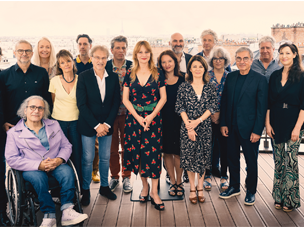On Tuesday 16 June, in an historically dire context for music, many authors, composers and publishers who are members of Sacem took part in the election of their representatives. They also voted in favour of essential statutory changes to face the current crisis, the effects [SC1] of which are becoming more lasting with every day. Their vote is a symbol of the trust they place in [SC2] Sacem in this difficult time. The entire Board of Directors particularly aware of its responsibility, to protect and rebuild.
The figures tell us that the music industry is experiencing an unprecedented disaster. EY estimates losses for our industry of 4.5 billion euros in the year 2020 alone. Authors, composers and publishers, who play a pivotal role but whose status is so fragile, are likely to lose over 250 million euro in earnings this year. One-quarter of the royalties that should have been collected never will be. A shock of that nature has never been seen since Sacem was created in 1851.
The study carried out by EY for the Tous pour la musique (TPLM) association indicates the risk of a significant domino effect: when some are in a weakened state, the entire chain is in danger, especially authors, composers and publishers whose revenue is totally dependent on the distribution of their works.
At Sacem, ever since 26 March, we launched an emergency plan of 43 million euros for our members: a relief fund for hardship, reinforcement of advances to cushion the blow, and a preliminary adaptation of our aid to prepare for recovery. These last months we have been supporting our members, who have been able to reimagine the way in which they work. We were the first society
of authors in the world to set up a method of remuneration for livestreams. And although the scene has been at a standstill for over a hundred days, we have launched the #ScèneFrançaise operation.
With your professional organisations, we have ceaselessly advocated to the Government. We are delighted that they have listened and our voices have been heard. But the bulk of the work still lies ahead of us. While artists-authors being eligible for the relief fund was a victory, we still do not know the details of the contributions for which they are exempt of, or how long this measure will last. However, it is vital that the solidarity fund remains in effect at least until the end of 2021 to account for deferred losses. In a similar vein, why should music publishing remain the only musical profession not to enjoy a tax credit? The reconstruction must also go through the National Music Centre (CNM), with an upstream-downstream runoff strategy. Authors, composers and publishers are the first to invest their time and money. They must be the first to be helped by specific aid programmes and a contribution to these creative investments. Allocating a new, significant, enduring tax resource to the CNM is now more important than ever.
The first challenge of this new mandate is clear: we need to constantly explain the specific needs of our professions. As always in the history of copyright, today’s pedagogy will become tomorrow’s rights. In a recent survey, 64% of our members highlighted that one of their greatest difficulties remains the general lack of knowledge about their professions. How can you rely on public policy when policymakers don't know your issues, since they don't know which "box" to put you in? More than ever, our strength lies in our collective administration, which brings together our professions to make our expectations better known and to amplify our voices.
Published September 18 2020


